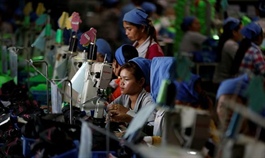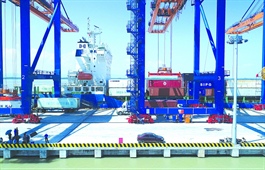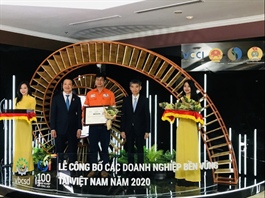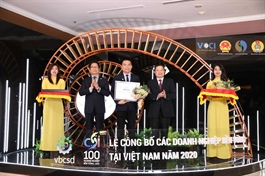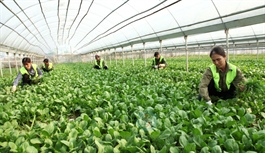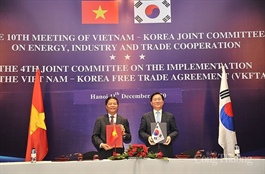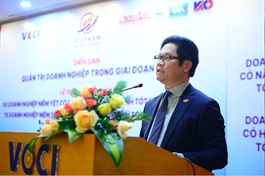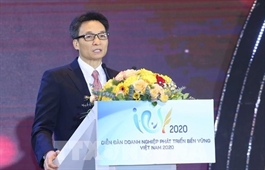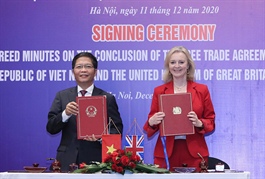Protecting business via property rights
Protecting business via property rights
With a rising number of applying companies eager to participate in the Vietnam Value Programme, intellectual property rights become an issue. VIR’s Hai Van spoke with Dr. Le Ngoc Lam, former deputy director general of the National Office of Intellectual Property under the Ministry of Science and Technology, about the hurdles that companies face in protecting their innovations.
How do you evaluate the role of intellectual property within the Vietnam Value Programme?

Dr. Le Ngoc Lam, former deputy director general of the National Office of Intellectual Property under the Ministry of Science and Technology
|
This is the first time the Vietnam Value Programme has been implemented according to Decision No.30/2019/QD-TTg dated October 8, 2019 on promulgating regulations on building, managing, and implementing the Vietnam National Brand Programme. The Ministry of Industry and Trade also published Circular No.33/2019/TT-BCT regulating the criteria system which, among others, states that the intellectual property of companies participating in the programme must be protected and that all registering enterprises must be the owner thereof.
This year, most of the registered enterprises had been aware of the importance of intellectual property rights (IPRs). However, there were very few patents for specific inventions and product quality. Most enterprises only have trademark certificates for their products’ design and shapes. Also, while many enterprises do own the IPRs or design patents, they cannot provide a certificate.
In addition, the programme does not limit the number of certificates or where these were registered. In theory, domestic businesses are also entitled to use foreign certificates to prove a patent. However, most firms ignored this point and did not show any such documents, even though some of them were claiming patent protection in overseas territories.
Another problem that caused some companies to lose points in the programme’s evaluation was that although many of them have had good ideas implemented and applied, they failed to register these as official innovations. These ideas were heavily invested in financially, but the results of their efforts, possibly also because of technical issues, were not published by the company.
All innovations and inventions derive from something else – that is one technical solution in production to bring more economic efficiency. If such innovations include a novelty feature, as well as other requirements stated in the Law on Intellectual Property, they should be registered and protected with a patent. If the businesses ignore this step in their work, they might lose the creative results they have worked so hard for.
What can businesses do if their national brands are infringed upon?
All national brand products, like any other traded goods and services, are protected by the Law on Intellectual Property. With this protection titles such as patents, businesses can enquire competent authorities that protect these rights to restrict any further violations of their rights and take the case to court if necessary.
Enterprises participating in the programme are made aware that protection titles are tools to protect production and business activities. But many are not aware of what to do if their rights are infringed upon and to which law enforcement agencies they should go to protect their rights accurately and quickly. Some businesses said their products had been compromised and blamed state agencies for not protecting their interests. However, most of these firms were quite passive and waited for state authorities to act and protect them, instead of actively collecting information about such infringements and providing access to authorities for protection.
How can the programme help raise awareness of intellectual property as an effective solution to help businesses protect their interests be raised?
The programme requires businesses and their products to meet certain criteria concerning quality, innovation, and creativity. However, the appraisal process of participating enterprises shows that many of them have confused the programme with pure awards for their brands. As companies register for the programme, they must make certain investments to achieve the requirements, which are meant to prove consistency with their development.
Saying so does not mean that enterprises can rely on their brands and that the quality of their products is guaranteed forever, which is the reason why the programme is run every two years, with some of its processes and criteria changing and adapting to recent developments.
Enterprises need to be aware of this, as branding and maintaining one’s brand names is a challenge. Generally, inventions are created all over the world, all the time, but only a few are registered in Vietnam. However, the value of these inventions is only maintained for a certain period, after 20 years, they usually expire.
Regarding intellectual property within the programme, what should businesses try to improve?
It should be clearer for businesses to understand what intellectual property is, as it is a vital tool to help them develop effectively and sustainably. However, regulations have not clearly explained what they need to prepare and provide with their application to participate in the programme.
An enterprise may have many product-related trademarks, but they only provide a very small number of protection titles or are not directly related to the registered corporation.
Moreover, to bring products to the market and protect them, businesses need to understand the variety of different titles and certificates as well as promote their activities to score within the programme.
When registering their trademarks in foreign territories, there are two important issues to consider. Firstly, some enterprises are completely indifferent to foreign markets. Even though they do business there, they fail to register IPRs to protect their activities.
Secondly, Vietnamese enterprises must register for protection in the markets where they are actually conducting production and business, may this be at home or in another market. Currently, there are companies, even large ones, that registered massively abroad “to reserve seats”.
In practice, this means they have to pay for registering rights overseas and to maintain validity. However, in some foreign jurisdictions, if not used, these rights may be removed. Some also require the rights to be used continuously for five years.
Additionally, each market has different intellectual property regulations, with some similarities to Vietnam, but most vary from country to country. If enterprises do not understand these, they can still be denied protection due to violating laws, especially when registering products. It is thus advised to seek help from local service units and lawyers to understand the necessary steps and levels of protection in foreign markets.
For 2022 and beyond, what can the programme’s organisers improve to increase awareness of IPRs for participating businesses?
I think the programme can bring together businesses according to their industries and organise training courses on IPRs. Such training would be an opportunity to help enterprises understand what they need to know and which legal entities have the right to register what, thus clearly defining the ownership rights of their products and services.







